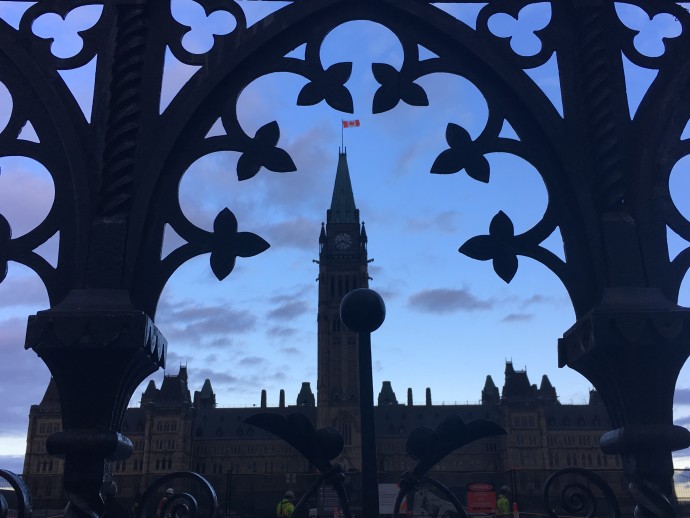Understanding the NEW OTTAWA: Roundtable. Dec 10
By

Summary Report
UNDERSTANDING THE NEW OTTAWA &
FINDING THE COMMON GROUND
Tuesday, December 10, 2019
4:00 to 5:30 pm Panel Discussion
Senate Building, 2 Rideau Street, Ottawa (Room B-45)
With a minority government, we want to focus on pressing parties to work together for the benefit of Canadians. The question asked of all parties should be “How will you keep this Parliament working for Canadians?”, rather than “How will you bring this Parliament to an end?”
As a think tank we want to highlight progressive policy advancement rather than gamesmanship. That was the focus of the discussion.
The Pundits Speak
KEVIN BOSCH, Former Advisor to Prime Minister Justin Trudeau and four Liberal Leaders before that. (Vice President, Public Affairs at Hill+Knowlton Strategies);
YAROSLAV BARAN, Former communications director to Stephen Harper, and former chief of staff to the Government House Leader (Partner, Earnscliffe Strategy Group)
ANGELLA MacEWEN, NDP candidate in 2019 (Senior Economist, CUPE National)
The new MPs Speak
MPs:
ADAM van KOEVERDAN, Liberal, Milton, ON
MATTHEW GREEN, NDP, Hamilton Centre, ON
JENICA ATWIN, Green Party, Fredericton NB
JULIE VIGNOLA, Bloc Québécois, Beauport—Limoilou, QC (confirmed but did not attend)
A Conservative representative was not confirmed
Co-Chairs:
Senator JULIE MIVILLE-DESCHENE, Independent Senators Group
ALICIA NATIVIDAD, Advisory Board Member, Pearson Centre (Lawyer)
The panel began with strategists evaluating the last elections, through the perspective of what went right and wrong for all parties, while examining the potential common ground for cooperation in the House of Commons during the current minority government. There was a consensus that there is a necessity for collaboration during the minority government. It was acknowledged that in the current circumstance, none of the political parties will be interested in going to early elections; therefore, they will need to work together in advancing parliamentary agenda for the benefit of Canadians. There was a view that with the need to compromise, parites may need to stay away from hard-edged or ideological or polarizing positions. Much is dependent on the attitude of the leaders in the House, and therefore the weekly House Leaders’ meetings should focus on cooperation. It was recalled that during the tenure of Prime Minister Lester Pearson, he managed to govern for two terms with a minority government, leaving behind a strong legacy for all Canadians, introducing some of the most innovative and non-partisan policies that shaped the modern Canada – including the Canada Pensio Plan, Medicare and the Maple Leaf Flag. Currently, the Government of Prime Minister Justin Trudeau should be humbler and maintain a laser focus on their agenda, as revealed in the Throne Speech and Prime Minister should be less exposed compared to his previous term. There should be more engagement with premiers and mayors in tackling matters of unity and national concerns, and it was considered a good move to appoint Chrystia Freeland as Deputy Prime Minister and Minister for Intergovernmental Affairs – someone who could focus on more federal-provincial cooperation across departments.
Takeaways from the Pundits:
The Conservative Party did well in winning the popular vote, but they fell short in the number of seats, having in being unable to have positions on a broad range of interest for Canadians. For example it was a failure not to include Indigenous policies in the platform and there were problems in communication in terms of their stance in abortion and same-sex marriage and to transmit to Canadians their policy on Climate Change.
The Liberal Party won the election and succeeded in selecting and introducing the right candidates in most of the ridings; the campaign was very disciplined and with the right kind of issues. Despite the SNC-Lavalin affair and the blackface issues that plagued the campaign, it managed to keep the focus on policies as compared to what the other parties were offering. They nevertheless underestimated the strength of the Bloc Quebecois and the NDP.
The NDP had limited resources, and their leader only gained profile well into the race, failing to attract the necessary coverage from media until election was called and notably the Leaders English Debate. The NDP felt that people liked their platform, but they had issues in distinguishing their stances from Liberals and because most of their potential voters feared a Conservative Government and were therefore tending to support the Liberal Party.
New MPs takeaways:
All new MPs participating in the panel were in awe of the new responsibilities they have assumed. They stressed the importance of cooperating and finding common ground on the issues that are of the utmost importance for Canadians. Among the topics that they agreed were important they discussed climate change, affordable housing, pharmacare and dental care, electoral reform, fighting poverty and making life more affordable. There were some differences in the analyses and in what needed to be done – generally in line with what parties had said during the campaign. Avoiding the theatrics of Question Period was considered as the best way to improve the perception of politics and forestall confrontation. There was an active call for more civility and diplomacy in parliamentarian affairs in finding common ground.



